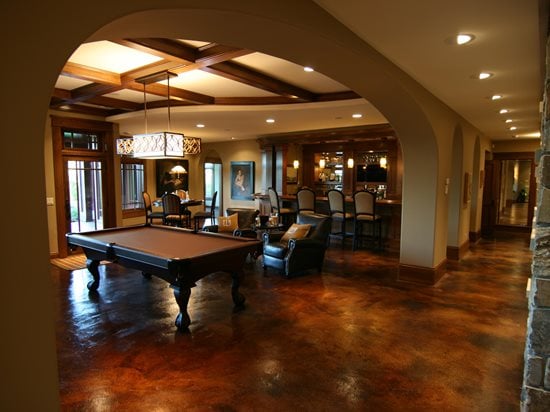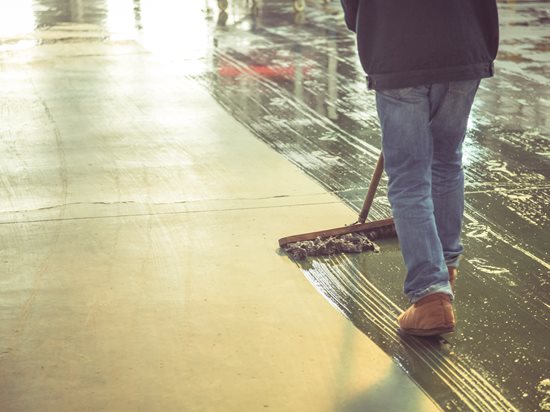How To Clean Textured Concrete Floors

Concrete Arts in Hudson, WI
No type of flooring material is truly maintenance free, and the same holds true for decorative concrete. Concrete floors are relatively easy to clean when compared with other types of flooring, especially carpet, but they do require regular attention. How much maintenance your floor will need largely depends on the amount of traffic it receives.
Concrete cleaning contractors near me.
Some of the many maintenance-related advantages to concrete flooring are:
- No joints, grout lines or fibers to trap dirt.
- Stain, water, and abrasion resistant when properly sealed.
- Pet-friendly, easy clean-up for muddy paws and accidents.
- Simple cleaning of dry or damp mopping.
- Minimal routine maintenance of reapplying sealer every few years.
HOW TO CLEAN CONCRETE FLOORS

hfzimages / Shutterstock
People who have concrete flooring love how quick and easy it is to clean. The basic steps are as follows:
- Dust mop, vacuum or sweep to remove dirt and debris from the floor
- Damp mop with a pH-neutral cleaner and clean water
- Let the concrete dry before allowing foot traffic or replacing rugs
- Reapply sealer or floor wax as needed for a protective coating
Tip: Clean spills from the floor as quickly as possible so they don't stain the surface.
Basic cleaning is easy to do yourself, but if your project requires special attention, hire a professional.
WHAT CLEANERS & EQUIPMENT SHOULD I USE ON MY CONCRETE FLOORS?
- A pH-neutral cleaner is best for decorative concrete flooring. Ask your contractor or the sealer or wax manufacturer to recommend their favorite cleaning solutions.
- Avoid harsh cleaning products such as ammonia, citrus, bleach, vinegar or pine cleaners because they can react with the concrete and etch the surface. Read more about choosing a concrete cleaner.
- Microfiber cleaning pads are recommended for both dry and damp mopping.
- In heavy-traffic commercial locations, equipment like an auto scrubber or swing buffer can be used
- A steam mop is an option for cleaning concrete flooring without using any chemicals
- For stubborn stains try some warm water and dish soap, then scrub with a bristle brush (use a degreaser if necessary)
- A wet vac may be helpful on larger projects to remove excess water
Shop Concrete Floor Cleaners, Waxes & Mops
HOW TO MAKE YOUR CONCRETE FLOORS EVEN EASIER TO MAINTAIN
- When designing your floor, keep in mind that saw cut patterns create narrow grooves in the surface that can trap dirt.
- In areas of heavy traffic, such as entrances and foyers, reduce maintenance and wear and tear by using indoor floor mats or rugs. Outdoor floor mats also help reduce the amount of dirt and grit that gets tracked in.
- Always follow the sealing or maintenance schedule recommended by your concrete contractor to keep your decorative floor looking its best.
HOW TO CLEAN STAINED CONCRETE FLOORS
Cleaning:
In most cases, residential stained concrete floors experience light foot traffic and this simple cleaning regimen will keep them looking like new for many years:
- Dry dust mop or damp mop regularly to keep away dirt and grime, cutting down on abrasion.
- Damp mop with a pH-neutral cleaner and water for an occasional deeper cleaning.
- Protect with a good film-forming sealer and a coat of wax or floor finish. Reapply as needed depending on wear, generally every few years.
Follow the same regimen for stained floors in commercial settings; however, more frequent application of protective wax is needed due to the increased foot traffic.
Sealers:
Stained floors should always be protected with a good floor sealer to help it resist water, dirt, stains and abrasion. This top layer of protection not only prolongs the life of your floor, it can also enhance the color and add sheen. Water-based sealers are generally recommended for indoor use because they don't contain harmful fumes. For more information, see this list of common questions about concrete floor sealers.
Wax:
For further protection against stains, dirt and abrasion, many contractors recommend applying a good commercial-grade floor wax designed for concrete floors on top of the sealer. This layer helps preserve the sealer by taking the brunt of daily wear and tear. It is much easier to buff out minor scratches and wear patterns from wax, and wax is also easier to reapply than sealer. This wax coating is often referred to as a sacrificial protective layer.
POLISHED CONCRETE MAINTENANCE
Due to the densification and polishing process, polished concrete floors are extremely durable. They are generally easier to maintain than other types of decorative concrete floors because they don't require sealers or waxes. With this basic cleaning routine, polished concrete should keep its luster for years:
- Dry dust mop regularly to remove dirt and grit.
- Damp mop occasionally with a pH-neutral cleaner or special cleaners and conditioners designed for polished concrete. These cleaners not only clean the surface, but leave behind a dirt-resistant film. They can be applied with a mop and do not require buffing.
- If the floor begins to eventually lose its shine, simply buffing the surface with a commercial polishing compound will often do the trick. If more touch-up is necessary, the floors can be lightly re-polished with a fine-grit abrasive. See this checklist for maintaining polished floors.
CLEANING PLAIN CONCRETE
Surfaces that haven't been treated with decorative finishes such as staining or polishing still need routine maintenance. Similar to decorative concrete, the type and amount of maintenance depends on the wear and tear the floor is exposed to from light foot traffic to heavy vehicles and grease. Another consideration when cleaning plain concrete is why is it being cleaned? Is it routine maintenance or is it being prepared for staining or decorative application?
For everyday routine maintenance:
- Clean the surface of dust and debris with a broom, blower, or garden hose.
- For stains, first try warm water and a soft (non-metal) scrub brush. Graduate to mild soap to strong soap, and finally adding ammonia.
- For stubborn stains, chemicals or degreasers may be needed. (These should only be used on plain concrete, not stained or polished surfaces.)
- Power washing can be done for exterior or semi-exterior surfaces such as garages.
- Sealing the concrete after a good cleaning can make the next go round much easier.
Do not use muriatic acid to clean concrete if you are planning on staining the concrete in the future. For more on this and surface preparation prior to staining or decorative application, see Cleaning Floors Before Concrete Staining.
Concrete Floor Maintenance Videos

Maintaining Concrete Floors with Heavy Foot Traffic
Length: 02:50
In this video find out how to maintain a concrete floor that gets heavy use and foot traffic.

Maintaining Concrete Floors with Light Foot Traffic
Length: 01:48
In this video find out how to maintain a concrete floor that gets light use and foot traffic.
Watch more concrete floor maintenance videos
FLOOR REPAIRS
Fixing Minor Flaws:
If your concrete floor experiences minor cracks, scratches or gouges, these flaws can almost always be repaired with the proper patching material. If the cracking is more severe or widespread, then the floor may need to be resurfaced with an overlay. In some cases, it's possible to accentuate existing floor cracks and make them part of the floor design through staining, saw cutting, and other techniques (see Incorporating Cracks in Concrete Floor Design).
Fixing Discoloration:
When applied properly, concrete floor stains and dyes penetrate deeply into the surface to provide permanent color that won't flake, peel or fade. However acid stains, which react chemically with the concrete, can be temperamental and cause color variations that weren't predicted. It's also possible for stains from spills or other accidents to be absorbed into the concrete if the floor isn't protected with a sealer or floor wax. There are several methods you can use to correct floor stains and discoloration, from applying a tinted sealer to changing the color entirely with a new coat of concrete stain or dye. See these tips for fixing discolored concrete floors.
Learn more about maintaining and fixing concrete floors: How to Fix Concrete Floors: Expert Tips
Concrete Sealer Buying Tips
How to Remove Glue from Concrete Floors
How To Clean Textured Concrete Floors
Source: https://www.concretenetwork.com/concrete/interiorfloors/caring.htm
Posted by: mcginnisanaturis.blogspot.com

0 Response to "How To Clean Textured Concrete Floors"
Post a Comment